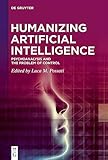Humanizing Artificial Intelligence : Psychoanalysis and the Problem of Control / ed. by Luca M. Possati.
Material type: TextPublisher: Berlin ; Boston : De Gruyter, [2023]Copyright date: ©2023Description: 1 online resource (V, 110 p.)Content type:
TextPublisher: Berlin ; Boston : De Gruyter, [2023]Copyright date: ©2023Description: 1 online resource (V, 110 p.)Content type: - 9783111007366
- 9783111007595
- 9783111007564
- 004
- online - DeGruyter
- Issued also in print.
| Item type | Current library | Call number | URL | Status | Notes | Barcode | |
|---|---|---|---|---|---|---|---|
 eBook
eBook
|
Biblioteca "Angelicum" Pont. Univ. S.Tommaso d'Aquino Nuvola online | online - DeGruyter (Browse shelf(Opens below)) | Online access | Not for loan (Accesso limitato) | Accesso per gli utenti autorizzati / Access for authorized users | (dgr)9783111007564 |
Frontmatter -- Table of Contents -- Introduction -- A Freudian Implementable Model of the Human Subject -- Psychoanalysis and Artificial Intelligence: Discontent, disruptive algorithms, and desire -- (Nothing) Human is Alien – AI Companionship and Loneliness -- How football became posthuman: AI between fairness and self-control -- From Tool to Mediator. A Postphenomenological Approach to Artificial Intelligence
restricted access online access with authorization star
http://purl.org/coar/access_right/c_16ec
What does humankind expect from AI? What kind of relationship between man and intelligent machine are we aiming for? Does an AI need to be able to recognize human unconscious dynamics to act for the "best" of humans—that "best" that not even humans can clearly define? Humanizing AI analyses AI and its numerous applications from a psychoanalytical point of view to answer these questions. This important, interdisciplinary contribution to the social sciences, as applied to AI, shows that reflecting on AI means reflecting on the human psyche and personality; therefore conceiving AI as a process of deconstruction and reconstruction of human identity. AI gives rise to processes of identification and de-identification that are not simply extensions of human identities—as post-humanist or trans-humanist approaches believe—but completely new forms of identification. Humanizing AI will benefit a broad audience: undergraduates, postgraduates and teachers in sociology, social theory, science and technology studies, cultural studies, philosophy, social psychology, and international relations. It will also appeal to programmers, software designers, students, and professionals in the sciences.
Issued also in print.
Mode of access: Internet via World Wide Web.
In English.
Description based on online resource; title from PDF title page (publisher's Web site, viewed 26. Apr 2024)


